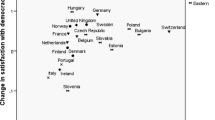Abstract
During the last decades, many studies have documented a persistent and widespread decline in satisfaction in some established democracies, giving empirical support to the heterogeneity of democratic systems in terms of their quality. The main implication is that if democracies vary in terms of their performance, such variation should be reflected in citizens’ satisfaction and support for democratic institutions and in citizens’ political trust. In this paper, we examine which factors are related to democracy satisfaction and political trust in the European countries, with a particular focus on the role of quality of democracy in shaping these attitudes. To comply with the aim of the study, we formulate a Hierarchical Generalised Bayesian Structural Equation Model (SEM). The proposed model combines the advantages of multilevel-multidimensional IRT models and SEM and accounts for explanatory variables and indicators at country and individual levels. To explain cross-national variations in the variables of interest, we rely on data from the European Social Survey (EES) and from the Democracy Barometer. The results show that trust in political institutions goes along with satisfaction with democracy. In addition, our findings highlight the existence of a spatial heterogeneous gap between citizens’ expectations and evaluations of democracy across ESS countries.








Similar content being viewed by others
References
Adams, R.J., Wilson, M., Wang, W.: The multidimensional random coefficients multinomial logit model. Appl. Psychol. Meas. 21(1), 1–23 (1997). doi:10.1177/0146621697211001
Andrich, D.: Models for measurement, precision, and the nondichotomisation of graded responses. Psychometrika 60(1), 7–26 (1995). doi:10.1007/BF02294426
Andrich, D.: Understanding the response structure and process in the polytomous Rasch model. In: Nering, M.L., Ostini, R. (eds.) Handbook of Polytomous Item Response Theory Models. Routledge, New York (2010)
Béguin, A., Glas, C.: MCMC estimation and some model-fit analysis of multidimensional IRT models. Psychometrika 66(4), 541–561 (2001). doi:10.1007/BF02296195
Beretvas, S.N., Kamata, A.: The multilevel measurement model: introduction to the special issue. J. Appl. Meas. 6(3), 247–254 (2005)
Charron, N., Lapuente, V.: Does democracy produce quality of government? Eur. J. Polit. Res. 49(4), 443–470 (2010). doi:10.1111/j.1475-6765.2009.01906.x
Coppedge, M., Gerring, J., Altman, D., Bernhard, M., Fish, S., Hicken, A.: Conceptualizing and measuring democracy: a new approach. Perspect. Polit. 9(2), 247–267 (2011). doi:10.1017/S1537592711000880
Cowles, M.: Accelerating Monte Carlo Markov chain convergence for cumulative-link generalized linear models. Stat. Comput. 6(2), 101–111 (1996). doi:10.1007/BF00162520
de Ayala, R.J.: The Theory and Practice of Item Response Theory. The Guilford Press, New York (2009)
De Battisti, F., Nicolini, G., Salini, S.: The Rasch model to measure the service quality. ICFAI J. Serv. Mark. 3(3), 58–80 (2005)
de Jong, M.G., Steenkamp, J.B.E.M., Fox, J.P.: Relaxing measurement invariance in cross-national consumer research using a hierarchical IRT model. J. Consum. Res. 34(2), 260–278 (2007). doi:10.1086/518532
DeMars, C.: Item Response Theory, Understanding Statistics Measurement. Oxford University Press, Oxford (2010)
Diamond, L., Morlino, L.: Assessing the Quality of Democracy. The Johns Hopkins University Press, Baltimore (2005)
ESS (2012a) Data file edition 2.1. Norwegian Social Science Data Services, Norway Data Archive and distributor of ESS data
ESS: ESS Round 6 Translation Guidelines. Mannheim, European Social Survey GESIS (2012b)
ESS: Sampling for the European Social Survey Round VI: Principles and Requirements. Mannheim, European Social Survey GESIS (2012c)
Gasiorowski, M.J.: An Overview of the Political Regime Change Dataset. Comp Polit Stud 29(4), 469–483 (1996). doi:10.1177/0010414096029004004
Gelman, A., Meng, X.L., Stern, H.: Posterior predictive assessment of model fitness via realized discrepancies. Stat. Sin. 6, 733–807 (1996)
Gelman, A., Carlin, J.B., Stern, H.S., Dunson, D.B., Vehtari, A., Rubin, D.B.: Bayesian Data Analysis, 3rd edn., Chapman and Hall/CRC (2013)
de Jong, M.G., Steenkamp, J.B.E.M.: Finite mixture multilevel multidimensional ordinal IRT models for large scale cross-cultural research. Psychometrika 75(1), 3–32 (2010). doi:10.1007/s11336-009-9134-z
Kamata, A.: Item analysis by the hierarchical generalized linear model. J. Educ. Meas. 38(1), 79–93 (2001). doi:10.1111/j.1745-3984.2001.tb01117.x
Kriesi, H., Lavenex, S., Esser, F., Matthes, J., Bühlmann, M., Bochsler, D.: Democracy in the Age of Globalization and Mediatization. Palgrave Macmillan (2013)
Little, R.J.: The Bayesian approach to sample survey inference. In: Chambers, R.L., Skinner, C.J. (eds.) Analysis of Survey Data, pp. 49–57. Wiley, Chichester (2003)
Maier, K.S.: A Rasch hierarchical measurement model. J. Educ. Behav. Stat. 26(3), 307–330 (2001). doi:10.3102/10769986026003307
Morlino, L.: Legitimacy and the Quality of Democracy. Int. Soc. Sci. J. 60(196), 211–222 (2010). doi:10.1111/j.1468-2451.2010.01717.x
Norris, P.: Democratic Deficit: Critical Citizens Revisited. Cambridge University Press, Cambridge (2011)
Parasuraman, A., Zheitmal, V.A., Berry, L.L.: SERVQUAL: a conceptual model of service quality and its implications for future research. J. Mark. 49(1), 41–50 (1985)
Rubin, D.B.: Inference and missing data. Biometrika 63(3), 581–592 (1976). doi:10.1093/biomet/63.3.581
Samejima, F.: Estimation of latent ability using a response pattern of graded scores, Psychometric Monograph, vol. 17. Psychometric Society, Richmond (1969)
Sheng, Y., Wikle, C.K.: Comparing multiunidimensional and unidimensional item response theory models. Educ. Psychol. Meas. 67(6), 899–919 (2007). doi:10.1177/0013164406296977
Sheng, Y., Wikle, C.K.: Bayesian multidimensional IRT models with a hierarchical structure. Educ. Psychol. Meas. 68(3), 413–430 (2008). doi:10.1177/0013164407308512
Sinharay, S., Johnson, M.S., Stern, H.S.: Posterior predictive assessment of item response theory models. Appl. Psychol. Meas. 30(4), 298–321 (2006). doi:10.1177/0146621605285517
Skrondal, A., Rabe-Hesketh, S.: Generalized Latent Variable Modeling: Multilevel, Longitudinal, and Structural Equation Models. Chapman & Hall/CRC, Boca Raton (2004)
Tanner, M.A., Wong, W.H.: The Calculation of Posterior Distributions by Data Augmentation. J. Am. Stat. Ass. 82(398), 528–540 (1987). doi:10.1080/01621459.1987.10478458
Thulin, M.: Decision-theoretic justifications for bayesian hypothesis testing using credible sets. J. Stat. Plan. Inference 146, 133–138 (2014). doi:10.1016/j.jspi.2013.09.014
Tuerlinckx, F., De Boeck, P.: Two interpretations of the discrimination parameter. Psychometrika 70(4), 629–650 (2005)
Acknowledgments
The authors are grateful to the editor and the anonymous reviewers whose comments and criticisms have greatly improved this paper.
Author information
Authors and Affiliations
Corresponding author
Electronic supplementary material
Below is the link to the electronic supplementary material.
Rights and permissions
About this article
Cite this article
Fontanella, L., Sarra, A., Di Zio, S. et al. A hierarchical generalised Bayesian SEM to assess quality of democracy in Europe. METRON 74, 117–138 (2016). https://doi.org/10.1007/s40300-016-0081-z
Received:
Accepted:
Published:
Issue Date:
DOI: https://doi.org/10.1007/s40300-016-0081-z




